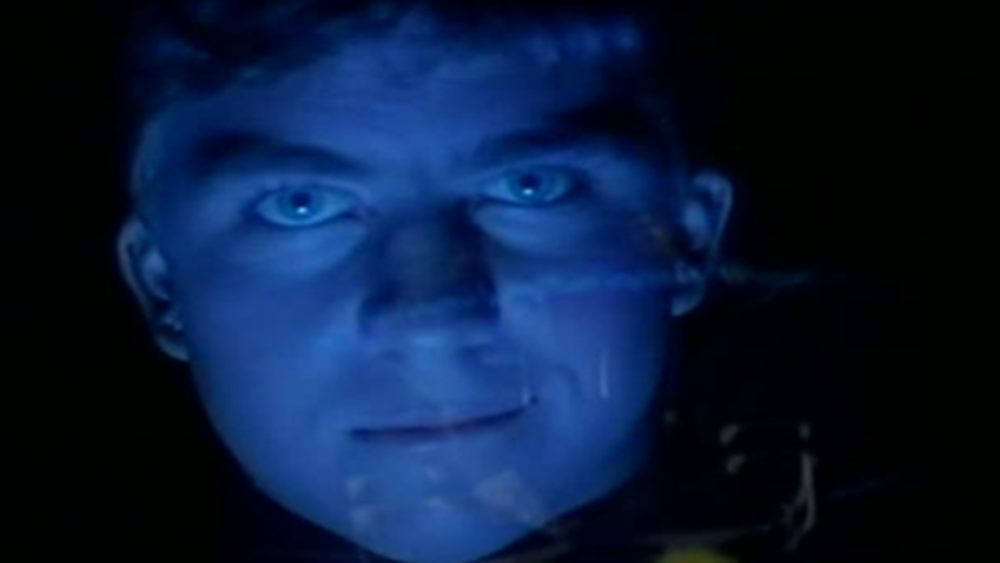
Depending on who you ask, Albert Pyun is either a dependable purveyor of cinematic junk food or an insult to the art of film direction. His work has been enshrined, so to speak, in the annals of Mystery Science Theater 3000. He worked extensively at Cannon Films, helming their ill-fated early-90s Captain America movie, which effectively killed off Cap at the movies for 20 years. But a deeper dive yields a litany of B-movie treasures: Jean-Claude Van Damme crucified to a beached ship’s mast in Cyborg, the childish slapdash exuberance of pop-culture melting pot Radioactive Dreams, the scrappy cyberpunk pyro show of Nemesis. These same pleasures are present in Arcade, a direct-to-video sci-fi cheapie that plays like an episode of Goosebumps filtered through the prism of “state of the art” early-90s VR technology and parent-group paranoia about the effect of gaming on kids.
True to the era’s media hysteria around youths and their hobbies, the film is poised as a literal battle for the souls of teenagers. It’s bookended by musings about the nature of the afterlife, and how Alex (Megan Ward) doesn’t believe in it. She’s painted as troubled; her mother committed suicide, her father is a slovenly deadbeat, and her counselor doesn’t seem like much help in the healing process. In an effort to cheer her up, her friends invite her to local arcade Dante’s Inferno (because of course that’s what it’s called) to playtest a new immersive adventure game called, confusingly, Arcade. When Alex’s boyfriend Greg (future Days of Our Lives player Bryan Dattilo) gives it a shot and loses, he gets sucked into the cabinet Tron-style by the game’s evil avatar, who looks like a bootleg version of Megabyte from ReBoot. It’s then up to Alex and her gaming whiz pal Nick (Peter Billingsley, aka Ralphie from A Christmas Story) to save him from the clutches of Video Game Hell.
Arcade’s defining aesthetic choice is its use of CGI to simulate a virtual reality setting. While the concept of VR video games was still on the bleeding edge in the early-90s, the technology behind it certainly wasn’t. Toy Story was still two years from being released at this point, and it had 30 animators and $30 million of Disney’s money to back it up. This most decidedly did not. If anything, Arcade has more in common with children’s game shows from the 90s like Knightmare and Cyber Zone than any contemporaneous sci-fi film. Like those shows and other period exercises in integrating VR into narrative art, Arcade’s outmoded visuals and chintzy synth score have catapulted it into the realm of vaporwave (see the wide shots of the game’s second level, i.e. the one with the titanium pterodactyl demon). It turns the dull end of the cutting edge into a hyper-accelerated form of 90s futurism. What once was a bug is now a feature.
The script, penned by a pre-superhero boom David S. Goyer, is alternately dirt simple and painfully ham-fisted. For every grace note involving kids farting around or a fast-talking CEO, there’s a stilted metaphor for the afterlife or the corrupting power of media. But Pyun’s craftiness as a director is always there to pull the film out of any tight spots: though the metaphor itself is a bit facile, Pyun’s rendering of the smoky, dark-light dungeon vibe of Dante’s Inferno is very evocative. The same goes for the Cronenbergian vibe of scenes at the excellently-named Vertigo/Tronics head office, where Alex and Nick enlist the help of weaselly-looking Pyun regular Norbert Weisser. There’s even a scene with two characters in a car contemplating just driving away from their problems that suggests that Pyun might have seen Thief once or twice. So while Arcade may not be for everyone, those who can appreciate its specific futurist B-movie charms and remarkable creativity will find plenty to treasure.
—
Directed by Albert Pyun; written by David S. Goyer; starring Megan Ward, Peter Billingsley, John de Lancie, Bryan Dattilo, and Seth Green; 85 minutes.



 Derek
Derek
 Isabelle
Isabelle